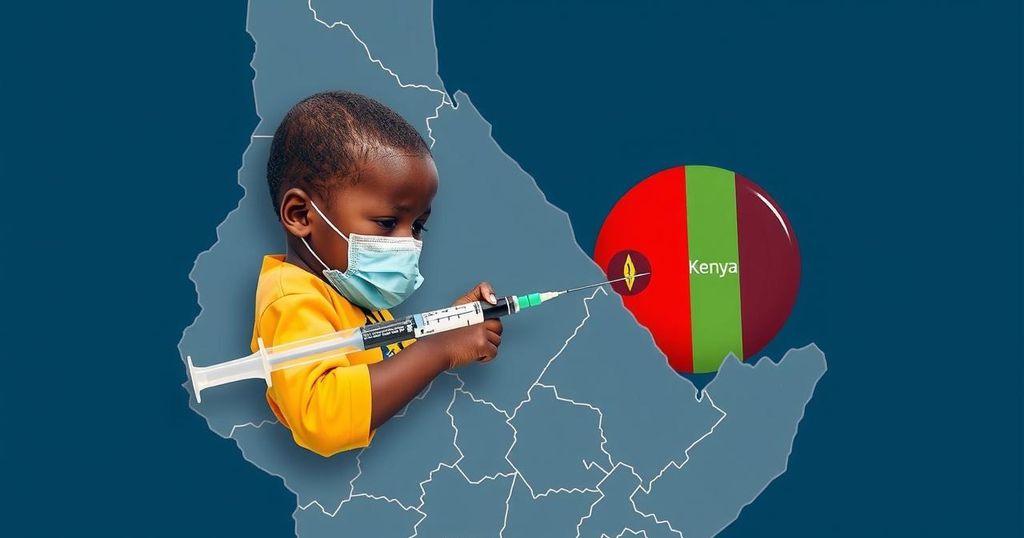Kenya and Uganda Unite in Successful Polio Vaccination Campaign for 6.5 Million Children

A synchronized polio vaccination campaign between Kenya and Uganda successfully immunized over 6.5 million children from October 3-6, 2024. This initiative was a coordinated effort to protect high-risk cross-border areas identified due to recent poliovirus detections. The collaborative approach emphasizes the importance of regional cooperation in eradicating polio and ensuring comprehensive vaccination for all children.
Between October 3 and 6, 2024, a remarkable synchronized polio vaccination initiative took place, successfully immunizing over 6.5 million children across the Kenya-Uganda border. This joint effort commenced with a coordinated launch in the Bungoma District of Kenya and the Mbale District in Uganda. Health authorities from both nations collaborated effectively, focusing on high-risk cross-border regions to mitigate the possibility of poliovirus transmission, thus ensuring the protection of children under five in these vulnerable areas. Recent detections of polioviruses prompted this urgent vaccination drive, with Kenya reporting six instances in 2024 alone, and Uganda noting one case through environmental surveillance. Health officials emphasized the importance of no child being unprotected due to proximity to international boundaries. Dr. Daniel Kyabayinze, the Director of Public Health in Uganda, reaffirmed the commitment, stating, ”Our health workers will vaccinate every child against polio door-to-door. Vaccination has eradicated many diseases in Uganda.” In addition to national strategies, collaborative efforts were made across all ten districts shared by both countries, covering a total of 772 kilometers. Dr. Charles Njuguna, the World Health Organization (WHO) country representative in Uganda, highlighted the urgency of the situation, asserting, “The virus is spreading fast in the East African region putting our children – particularly aged 5 years or below at the risk of contracting this incurable yet vaccine-preventable disease.” The outbreak in Eastern Africa has been exacerbated by high-risk population movement across borders, prompting Kenya and Uganda to synchronize their vaccination campaigns this October and again in November, which has received commendation from the Global Polio Eradication Initiative (GPEI). This initiative is integral to a broader strategy aimed at closing immunization gaps, particularly targeting “zero-dose” children who have never been vaccinated. The cooperative approach between Kenya and Uganda underscores the principle that polio eradication relies on regional collaboration to achieve comprehensive health objectives.
The synchronized polio vaccination effort between Kenya and Uganda is a vital public health initiative addressing a critical health challenge in East Africa. With recent cases of poliovirus detected, both countries recognized the urgent need to protect their children, particularly in high-risk cross-border areas. This approach exemplifies how international cooperation can prevent the transmission of infectious diseases, reflecting the commitment of both nations to ensure every child is vaccinated, regardless of their geographical location. Polio remains a significant threat in regions where mobility is high, and this collaborative vaccination initiative sets a precedent for future health campaigns aimed at eradicating vaccine-preventable diseases.
The cross-border synchronized polio vaccination campaign between Kenya and Uganda illustrates the importance of regional cooperation in combatting infectious diseases. With a successful vaccination of over 6.5 million children and a commitment to prevent future outbreaks, this initiative not only protects the health of the local populations but also contributes to global health security. As Kenya and Uganda demonstrate effective strategies to close immunization gaps, their example serves as an inspiration for other nations facing similar public health challenges. Their efforts reaffirm that no child should be left unprotected due to geographical boundaries, proving essential in the collective fight against polio.
Original Source: www.afro.who.int







